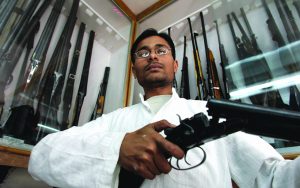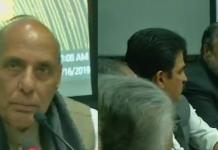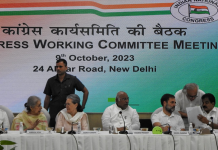
In this photograph dated 06 April 2007, Indian arms vendor Gulzar poses in his shop with a double-barrelled shotgun, in Kanpur, about 80 kms outside of Lucknow. Customers usually come from far and wide to buy rifles and shotguns from the dozens of tiny shops clustered in a bazaar in the ramshackle town of Kanpur, billed as the gun capital of India’s Uttar Pradesh state, 14 April 2007. But business has stopped. Arms sales have been banned as the country’s largest state — infamous for lawlessness — holds month-long polls under heavy security, halting one of the area’s most profitable sectors. AFP PHOTO/ MANAN VATSYAYANA
An investigation carried over months by the Anti-Terror Squads (ATS)of Rajasthan and Madhya Pradesh has revealed that the fake arms licenses procured from J&K have led to the proliferation of illegal weapons across several states. In the past six years alone, around 40,000 licenses have been issued in the state.
The reason for this is that it is not difficult to get a license in the state, if you fake the identity of a security personnel: that is, produce a forged letter from a commanding officer of an army unit and use a picture in the application form wearing an army uniform and grease the palms of the concerned officials.
What is more, most of these licenses have not been issued to the J&K residents but to the outsiders. This, in turn, has triggered an illegal arms trade in some states with thousands of people possessing arms on fake documents. Alarm bells so triggered have led to investigations by Madhya Pradesh and Rajasthan ATS who are trying to reveal the extent of the scam.
The J&K government too has started a probe to be carried out by the State Vigilance Organisation. The state’s home department has ordered the divisional commissioners of Kashmir and Jammu regions to verify all cases of individual new arms licenses issued between January 1, 2017, to February 23, 2018, in eight districts of the state.
And pending this verification, the district magistrates of Kishtwar, Kupwara, Ganderbal, Leh, Rajouri, Ramban, Reasi and Udhampur have been asked not to issue any new individual arms license till further orders.
And also the district magistrates in the state have been directed to take urgent steps to revoke all such “individual arms licenses issued to various persons excluding the personnel of State Police, Army and Central Armed Police Forces (CAPFs), which don’t meet all the conditions prescribed in Rule 11 and Rule 12 of the Arms Rules, 2016”.
According to sources, in the past year alone, 5000 arms licenses have been issued in the state, two-thirds of which are fake. The state has issued a total of 4,29,301 licenses and only 10 per cent of the number are for the J&K residents.
J&K Government’s order also requires the district magistrates to ensure “all such persons, whose licenses are revoked, to deposit their arms and ammunition with the officer in charge of the nearest police station, failing which action as warranted under law will be initiated”.
The probe has brought under its scanner the district magistrates from the various districts which have witnessed the issuance of the most of the licenses.
“It is true that the district level officers are involved in the scam,” said a State Vigilance Organization official. “The investigation will pin the responsibility and help bring the guilty to justice.”
The lid on the scam was blown off after the Rajasthan ATS launched the ‘Operation Jubeida’ in May last year into the inter-state arms racket involved in procuring fake arms licenses from J&K.
Alerted by the scale of the illegal weapons trade, centre has also moved to launch a National Database of Arms Licenses system in April next year and provide each license holder a unique identification number (UIN) for renewal and other purposes.
It will be mandatory for all licensing authorities in the country to enter data in the new system, any arms license without UIN would be considered invalid.
“In case a person applying for a license for restricted category of arms or ammunition was also a holder of a license for permissible category, or where the applicant applying for permissible category of arms or ammunition was also a holder of a license for restricted category, the licensing authority concerned shall issue a new license for restricted or permissible category of arms or ammunition under the existing UIN of the licensee,” the government notification has mentioned.
However, it is still around a year to go before the database is created. And it would be a painstaking process to provide each licensed item a UIN. But the problem now is tracing the illegal weapons procured through fake licenses in J&K.
“There are two dimensions to the problem. One is fixing the responsibility of the officials for issuance of fake licenses. Another is seizing the consequent illegally bought arms,” said an official. “The simultaneous investigation into the scam in several states has, however, created sufficient realisation of the need to take urgent corrective measures. And we hope we could get a handle on it in near future.”
letters@tehelka.com













